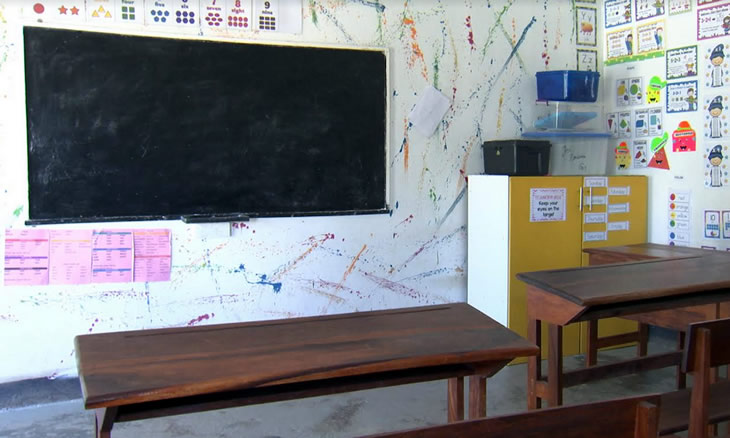Mozambique: LAM to purchase five new aircraft by December
The crisis in private schools and its impact on resumption of face-to face classes

Photo: O País
Private educational institutions have all been affected by the coronavirus pandemic, according to data from the National Statistics Institute (INE). Debts, overdue wages, suspension of activities and of workers are some of the warning signs offered by private companies.
In the 13,833 schools that make up the National Education System in Mozambique, the noise in classrooms has given way to silence – a silence forced on them by the new coronavirus pandemic, which has plunged private educational institutions into financial crisis.
There are 87 private schools in Maputo province, teaching from pre-school to secondary school. Among them is Colégio Real da Matola, which, in six months of the pandemic, has seen the number of students paying tuition fees drop from 120 to eight. In other words, the parents and guardians of 112 pupils have failed to honour their commitments.
Dionísia Sibundy, Colégio Real da Matola college principal, explains that “recognising that there was a change in the contract between the parties, the institution reduced tuition fees by 60%, from 8,200 to 3,250 meticais”, but, to her dismay, “parents still refused to pay”.
Dionísia Sibundy says that, constrained to keep paying current expenses, the continuity of her business is at stake.
“Without cash, we had to reduce the number of workers. Of the 25 workers we previously employed, we ended up giving unpaid vacations to 14 of them, and those who continue to work are receiving only 25% of their wages,” Dionísia says.
College facilities are leased at 65,000 meticais per month, which management was able to pay for four months by diverting investment spending, but it can now no longer honour its responsibilities.
Four schools have closed in Maputo and Matola
Mauled by the crisis, private schools in Maputo province decided to come together and create an association that gives voice to their concerns.
Dionísia Sibundy is chairperson of the installation committee of this association, which has already been approved by the Ministry of Justice and is awaiting an opinion from the Maputo Province State Secretariat, and reveals the number of schools which have already closed.
“We are not succeeding, and many schools here in the city of Matola are already closing. I am aware of three schools that have already closed their doors and are negotiating with their landlords to see if they can deliver the facilities or accumulate (…) debt for next year,” she explained.
In Maputo, the Nyoxani Centre for Personal Development and Inclusive Education, is one of the institutions that has suspended classes. Without clear guidance on whether tuition fees should be paid or not, the institution, which teaches pre-school and primary education, has seen 75% of parents and guardians fail to pay tuition fees. Classes continue to be taught digitally, and the need to pay salaries and current expenses such as water and energy continues. However, the establishment’s 150 workers had not received wages for four months and the situation became untenable.
“We had to stop activities, which we hesitated to do for a long time because we considered that parents should not be sacrificed for the failings of [other] parents. The technical and administrative services staff are still working,” pedagogical coordinator at Nyoxani, Miguel Pristas, says.
Other sources of financial support for the institution were school transport, food and extracurricular activities, for which an additional fee had to be paid. “All of this also had to be paid for,” Prista complains.
Data from the survey on the impact of Covid-19 on companies carried out by INE indicates that there are 946 private schools, from pre-school to higher education, all of which were % affected by the pandemic.
According to INE, education is one of the few areas that has been drastically affected by the Covid-19 crisis. Of these 946 institutions, 3.1% closed their activities, affecting 125 workers; 1.7% suspended employment contracts, affecting 183 people. Fortunately, there were no contract terminations.
Ministry of Education speaks of legal limitations to decide on fees
In April, private schools in the city and province of Maputo created the Private Schools Forum to their concerns and establish a platform for dialogue with the Ministry of Education.
Miguel Pristas, coordinator of Nyoxani, is one of the founding members and explains what is, for him, a fundamental problem in the sector.
“There are no sustainability policies, or less specific regulations for schools in the private sector in the commercial sphere, even though we are linked to the Ministry of Education because of our social role,” he observes.
Cármen Zucula says that private schools feel unprotected by the guardianship institution [Ministry of Education]. “We feel abandoned. To give you an idea, the Ministry of Education and Human Development does not have a department dedicated to private education. We are within an area called cross-cutting issues, which shows that we are still not getting due attention.”
‘O País’ contacted the Education Ministry which, through its spokeswoman, Gina Guibunda, denies that private schools have been abandoned and says that there are legal limitations on what MINEDH can decide about the payment of tuition fees.
“We have no legislation that authorises us [Ministry] to say, for example, that from today onwards, the schools X, Y or Z will charge A, B or C, in terms of fees, just as we have no legislation telling parents or guardians to start paying a given amount after a given moment,” Gina Guibunda explained.
Lídia Rita, representative of Colégio Nhamunda and founding member of the Forum of Private Schools, says that the private sector did not expect any particular position on tuition, but a statement that valued the work that schools are doing.
“What schools wanted to hear from the Ministry was only a matter of stating that what private schools are doing is not illegal, in order to at least stop the allegations that private schools constitute some form of unlawful enrichment, and stop the lawsuits in the courts,” she said.
“Together with the other ministries, we are already working on legislation to address this situation and prevent future cases,” she added.
Unable to meet BNI financing criteria
Last July, the government, through the National Investment Bank (BNI), created two lines of financing budgeted at 1.6 billion meticais to help micro, small and medium-sized national companies address the negative impact of the Covid-19 pandemic.
‘O País’ has established that the Instituto Nília in Maputo managed to source two thirds of the amount it requested. But other private schools complain that the criteria for access to finance are very demanding for private institutions.
Lídia Rita, from Colégio Nyamunda, says: “Nobody is getting [these amounts], because one of the criteria is that the applicant cannot exceed a certain level [of bank balance] (…). Now, almost all of us work with banking. Then, they want guarantees, and many of us operate in facilities that are not our own, that are leased.”
The BNI promised to comment on the matter this week.
By António Tiua













Leave a Reply
Be the First to Comment!
You must be logged in to post a comment.
You must be logged in to post a comment.